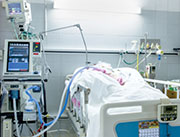Intense Reactions to Intensive Care


UNIQUE BUT NOT RARE According to one statistic ICU delirium affects a staggering 80 percent of all ICU patients. Another stat suggests that one in every three patients who spends more than five days in an ICU experiences some form of psychotic reaction
"I was sitting with my husband in the ICU when he suddenly began ripping at his IV line yanking at the wires and saying over and over again ‘I have to get out of here!’ ” remembers Ariella who still gets emotional when discussing her husband’s weeklong stay in the intensive care unit (ICU) several years back. “I tried calming Dovid but he just stared back at me with this frantic look in his eyes. He seemed to have no idea who I was.”
Over the next 24 hours things quickly deteriorated. Dovid began experiencing hallucinations and delusions that came and went. There were moments when he didn’t recognize his wife of over a decade and moments when he’d berate her for mistreating him. Once he actually accused her of trying to kill him.
“I was completely dedicated to my husband while he was hospitalized at his bedside throughout the day and night constantly speaking to doctors and nurses about his care and condition. But when he began hurling ridiculous accusations at me it was just too much for me to take ” says Ariella. “Even once he recovered I couldn’t forget what he’d said.”
Dovid was originally placed in the ICU following complications of pneumonia. Ariella is quick to point out that when he was admitted his symptoms were solely physical. The erratic behavior he began to exhibit a day after he was placed in the unit was not only alarming but shocking.
Fortunately the doctors were able to pinpoint the cause of Dovid’s bizarre symptoms: a lack of oxygen. What Ariella did not know at the time however was that her husband was among the millions of patients hospitalized annually who experience the onset of serious psychiatric symptoms while confined to the ICU an under-recognized condition known as ICU delirium or ICU psychosis.
Inside the ICU
If you’ve ever had the misfortune of seeing the inside of an intensive care unit you’re all too familiar with the continuous bright lights sleep disturbances and other constant stimuli that classify the surrounding. There’s a lack of awareness of the greater world a dimming of the senses that relate to time and place. And of course the unique brand of stress that accompanies lack of sleep and loss of control over one’s own life.

There are ongoing efforts at many hospitals today to minimize the occurrence of ICU psychosis. Sedation and ventilation — now understood to increase the risk of the condition — are considered only as a last resort
For many patients the powerful combination of environmental stressors within the ICU is enough to trigger incidents of psychosis. There are also a host of other reasons why patients may suffer from this condition including poorly controlled pain reactions to medication infection or lack of oxygen.
While delirium can occur in any ward it’s more common in the intensive care unit because the patients are so ill. There is also more deregulation of the sleep-wake cycle in the ICU than in other wards because patients are so ill and need to be monitored more closely.
“It can be a real shock to see a patient who was super-active become completely incapacitated ” says Miriam Kaplan RN-BSN a nurse in the intensive care unit of a large New York City hospital. “It can also be insulting or frightening to family when the patient doesn’t recognize them know what year it is or acts in a bizarre way. This is one of the reasons we don’t allow children in the ICU. It’s very difficult to see.”
But ICU psychosis is not only frightening to witness; it can be extremely dangerous. “In addition to nonmedical implications such as the possibility of falling out of bed untreated delirium can progress into full-blown dementia ” explains Dr. Jordan Klesmer a consultation-liaison psychiatrist with North Shore University Hospital in New York. Indeed delirium is also linked to cognitive damage and post-traumatic stress disorder (PTSD).
And then there’s the inherent danger of not recognizing the medical cause behind the symptoms. An undiagnosed infection dehydration or lack of oxygen can have devastating results. It’s small wonder that studies show that ICU delirium can result in worse medical outcome and even increased morbidity. (Excerpted from Family First Issue 542)
Oops! We could not locate your form.











